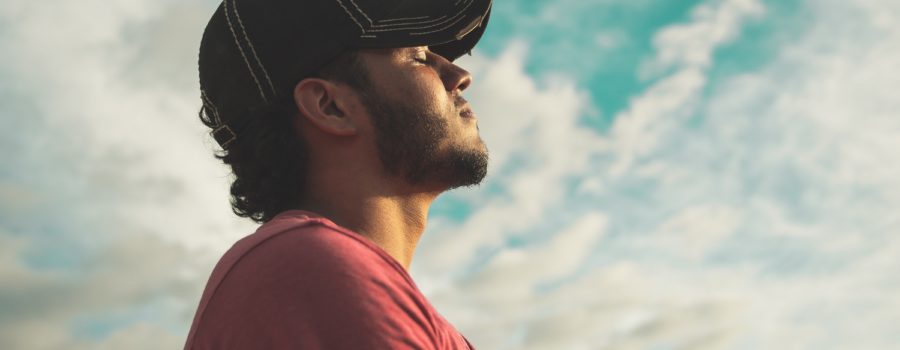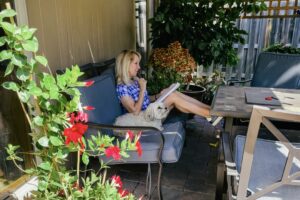Do you have problems falling asleep? Are you over-stimulated at night and can’t seem to wind down when your head hits the pillow? It might be because your body is confused on whether it’s day or night. We have the wonderful modern convenience of electricity allowing light at any time – day or night. This makes our lives easier and helps us to extend our days, especially during the winter months when it gets dark at 5pm. Imagine a life without electricity today. We would have to light candles at night and perhaps read or play games by candlelight, instead of watching television or working on our computers.
Now, light is accessible 24 hours a day, and it’s wreaking havoc on our sleep cycles – confusing our bodies about when it’s time to sleep and when it’s time to wake. In the 1800’s, most people worked outside and were exposed to the change between sun-up and sun-down. It was naturally built into their day. They also were doing physical activity and by the time the sun set, their bodies were physically worked and tired. Today, many of us work in office settings under artificial light and rarely spend time outdoors during our day. More people than ever are having sleep problems. Many are not able to fall asleep, or stay asleep once they finally do. This may be attributed to lack of natural light and the ongoing connection to artificial lighting.
Another factor at play is the overuse, or mis-timed use, of blue light blocking glasses. These have become a trend and many people have come to believe that all blue light is bad and should be minimized. This isn’t the case. Blue light is actually necessary and normal to be exposed to during the day. It helps tell our bodies we’re supposed to be awake and we expect to be exposed to some blue light. It becomes a problem, however, when we’re exposing our eyes to blue light in the evening hours and especially overnight when we should be sleeping. Blue light blockers should be reserved for those times of the day when we don’t want the light to affect our body’s ability to sleep well.
No wonder it’s been reported that 40 million people have chronic long-term sleep disorders in the US, and another 20 million have occasional sleep problems!
Our bodies have a natural, internal clock known as the sleep-wake cycle. This internal cycle is called the circadian rhythm. It works over an approximate 24-hour cycle and helps the body regulate daytime and nighttime. One of the best ways to help our body regulate that cycle is to get some sunlight into our eyes first thing in the morning. This morning light therapy plays an important role for the rest of our day and night.
Our eyes contain photosensitive cells in the retina which affect the brain’s hypothalamus region. The hypothalamus influences our circadian rhythm for normal sleep patterns, hormone regulation, behavior and better reaction time. It helps manage jet lag and returning your body to a regular schedule. These receptors in our eyes also respond to sunlight by directly affecting the pituitary gland, especially from the blue unseen spectrum which play an important role not just in the brain, but in our whole body physiology.
Exposing your eyes to sunlight in the morning is associated with a release in serotonin, the hormone responsible for lifting our mood, and making us feel better and calmer. This plays an important role in melatonin production because your pineal gland metabolizes serotonin into melatonin. Melatonin is an important and necessary hormone for proper sleep function in the dark. So now you can see how these photosensitive cells in our eyes utilize the sunlight to stimulate the full range of important functions required for daylight activity and nighttime sleep cycles.
We’re focusing mostly on sleep here, but sunlight exposure provides another interesting benefit: appetite suppression. Exposure to UV light helps activate melanocyte-stimulating hormone (MSH) in your body. MSH helps regulate appetite and reduces feelings of hunger. And while we’re talking about benefits of sun exposure, remember also that it’s your best bet for making Vitamin D naturally. Most adults are Vitamin D deficient, which is a problem as it plays an important role in our overall health and immunity.
Now that we know the benefit of sunlight exposure, how do we incorporate it when we have day jobs in an artificially-lit environment? Here are some ways you can help reset your body clock.
- When you get up in the morning, open the blinds and take advantage of the sunlight coming in through your window.
- Better yet, get outside. Maybe take a walk, or just sit outside with your coffee. When you do, be sure to leave your sunglasses behind so that your eyes can take full advantage of all the benefits the morning sunlight offers you. You do not want to shield your eyes at this time. Don’t look directly at the sun, just let the natural light come into your eyes as you look around. I let my dog out in the morning and I use this time to help my body wake up to a new day – to literally see the light and reap the benefits that doing so provides physically and mentally.
- If you can’t get outside in the sunlight before you head to work, try to sneak outside for a 10-minute break, again, without your sunglasses on and soak in the sun.
- Get outside during sunset. The natural light that’s emitted at sundown helps tell your body to prepare for sleep in the coming hours.
The best windows of time for reaping the benefits of this practice is between sunrise and 11:00 AM, and during sunset. If you try #2 or #3, keep that in mind. You might also wonder about whether cloudiness affects impact, and the answer is “no” – other than potentially making your day cooler in temperature.
One more thing – your nighttime routine matters, too. Be sure to turn off computers, cell phones and any other blue light electronics you have at least one hour, and preferably two, before going to sleep. Help your body follow its natural sleep and wake cycles and keep artificial light from confusing that crucial balance.
Do try this at home, and get ready to feel better throughout your day, and sleep better at night.
Active-ist for your health,
Irene







